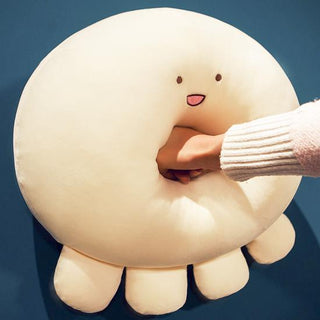At first glance, it may seem like there's no harm in giving your baby a plush toy. After all, what could be more innocent than a cuddly teddy bear? However, there are actually a few things you should consider before plopping a stuffed animal into your baby's crib. In this blog post, we'll explore the pros and cons of giving your baby a plush toy so that you can make an informed decision.
The Pros of Giving Your Baby a Plush Toy
There are several advantages to giving your baby a plush toy. For starters, plush toys can help your baby to develop emotionally. According to Dr. Pamela Everitt, an early childhood development expert, cuddling a soft toy can help babies to feel safe and secure (1). In addition, plush toys can also be a source of comfort for babies when they're feeling sad or upset. Everitt notes that "a child's imagination allows them to transfer their feelings onto the toy" (1). This means that your child can use the plush toy as a way to work through their emotions in a healthy way.
Another pro is that plush toys can encourage your baby's development physically. For example, by grasping and squeezing a stuffed animal, your baby will be strengthening the muscles in their arms and hands. And as they grow older and begin to crawl and walk, chasing after their favorite stuffed animal will give them much-needed exercise.
Lastly, plush toys can help to stimulate your baby's senses. Brightly colored stuffed animals with interesting textures can capture your baby's attention and help them to explore the world around them in a fun and safe way.
The Cons of Giving Your Baby a Plush Toy
While there are some definite benefits to giving your baby a plush toy, there are also some potential drawbacks that you should be aware of. One potential downside is the fact that stuffed animals can collect dust mites (1). These tiny creatures thrive in warm and humid environments—like bedrooms—and they feed on human skin cells (2). This means that if your child suffers from allergies or asthma, having a plush toy in their crib could trigger an attack or aggravate their symptoms.
Another thing to consider is that some plush toys contain small parts—like buttons or beads—that could pose a choking hazard for young children (3). It's important to inspect any stuffed animals that you're considering giving to your child to make sure that they don't have any small detachable parts.(4). If you do decide to give your baby a plush toy, choose one that is well-made and free of toxic chemicals so that you can rest assured knowing that your child is safe and comfortable. When it comes right down to it, only you can decide whether or not giving your baby a plush toy is the right decision for your family. Weighing the pros and cons carefully will help you to make an informed choice about what's best for your little one.
In conclusion, while there are some benefits to giving your baby a plush toy, there are also some potential drawbacks that you should be aware of. Ultimately, only you can decide whether or not giving your baby a stuffed animal is the right decision for your family. Carefully weigh the pros and cons before making a final decision about what's best for your little one.
What do you think? Are plush toys good for babies? Let us know in the comments!





